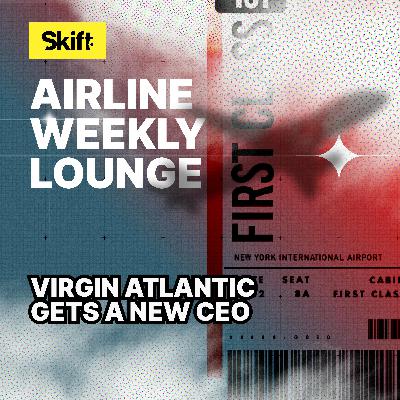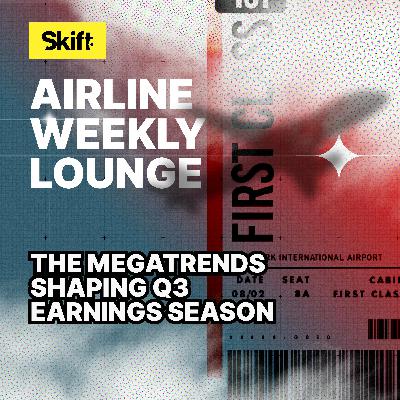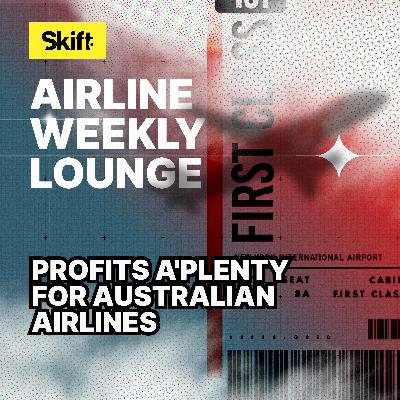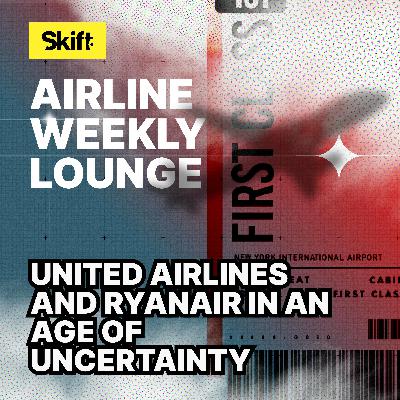Discover Airline Weekly Lounge Podcast
Airline Weekly Lounge Podcast

Airline Weekly Lounge Podcast
Author: Skift
Subscribed: 566Played: 12,271Subscribe
Share
© 2025 Skift, Inc. All Rights Reserved
Description
The editors of Airline Weekly discuss the most interesting developments within the commercial airline industry. In keeping with Airline Weekly’s style, conversation generally centers on one question: How do you make money in this industry?
401 Episodes
Reverse
In this special episode, we bring you the full recording from our recent LinkedIn Live webinar (Click This Link For Video Version).
Titled ‘Airlines in 2026: Flying into Trouble?’, Gordon is joined by Jay and Meghna to set the scene for the year ahead, with all of the challenges and opportunities that it may bring.
Follow the Hosts:
Gordon Smith – LinkedIn
Jay Shabat – LinkedIn
Meghna Maharishi - LinkedIn
Connect with Airline Weekly
LinkedIn: https://www.linkedin.com/company/airline-weekly/
X: https://x.com/Airline_Weekly/
Facebook: https://www.facebook.com/airlineweekly/
Instagram: https://www.instagram.com/skiftnews/
WhatsApp: https://whatsapp.com/channel/0029VaAL375LikgIXmNPYQ0L/
Subscribe to @SkiftNews and never miss an update from the airline and travel industries.
In part one, Gordon and Jay reflect on the latest financial insights from Emirates, and examine the challenges that could lie ahead for the Dubai-based giant. In part two, the conversation turns to a disappointing set of Q3 results from KLM.
Follow the Hosts:
Gordon Smith – LinkedIn
Jay Shabat – LinkedIn
Connect with Airline Weekly
LinkedIn: https://www.linkedin.com/company/airline-weekly/
X: https://x.com/Airline_Weekly/
Facebook: https://www.facebook.com/airlineweekly/
Instagram: https://www.instagram.com/skiftnews/
WhatsApp: https://whatsapp.com/channel/0029VaAL375LikgIXmNPYQ0L/
Subscribe to @SkiftNews and never miss an update from the airline and travel industries.
In part one, Gordon and Jay break down Ryanair’s latest earnings and uncover what keeps Europe’s biggest low-cost airline flying high. In part two, they share key takeaways from the CEOs of Etihad and Oman Air at the Skift Global Forum East — including how Gulf carriers see the next phase of global travel growth.
Follow the Hosts:
Gordon Smith – LinkedIn
Jay Shabat – LinkedIn
Connect with Airline Weekly
LinkedIn: https://www.linkedin.com/company/airline-weekly/
X: https://x.com/Airline_Weekly/
Facebook: https://www.facebook.com/airlineweekly/
Instagram: https://www.instagram.com/skiftnews/
WhatsApp: https://whatsapp.com/channel/0029VaAL375LikgIXmNPYQ0L/
Subscribe to @SkiftNews and never miss an update from the airline and travel industries.
In part one of this week's show, Jay and Meghna discuss the latest developments regarding the U.S. government shutdown and its impact on air travel. In part two, their attention turns to JetBlue and its latest earnings report.
Follow the Hosts:
Meghna Maharishi – LinkedIn
Jay Shabat – LinkedIn
Connect with Airline Weekly
LinkedIn: https://www.linkedin.com/company/airline-weekly/
X: https://x.com/Airline_Weekly/
Facebook: https://www.facebook.com/airlineweekly/
Instagram: https://www.instagram.com/skiftnews/
WhatsApp: https://whatsapp.com/channel/0029VaAL375LikgIXmNPYQ0L/
Subscribe to @SkiftNews and never miss an update from the airline and travel industries.
In part one of this week's show, Gordon and Jay examine some of the factors creating headwinds for United in the U.S domestic market. In part two, we turn our attention to Europe and discuss a rare joint interview with the CEOs of Air France-KLM and Lufthansa Group.
Follow the Hosts:
Gordon Smith – LinkedIn
Jay Shabat – LinkedIn
Connect with Airline Weekly
LinkedIn: https://www.linkedin.com/company/airline-weekly/
X: https://x.com/Airline_Weekly/
Facebook: https://www.facebook.com/airlineweekly/
Instagram: https://www.instagram.com/skiftnews/
WhatsApp: https://whatsapp.com/channel/0029VaAL375LikgIXmNPYQ0L/
Subscribe to @SkiftNews and never miss an update from the airline and travel industries.
In part one of this week's show, we discuss a changing of the guard at Virgin Atlantic, as CEO Shai Weiss prepares to step down after seven years. In part two, we contextualize a strong set of Q3 figures from Delta.
Follow the Hosts:
Gordon Smith – LinkedIn
Jay Shabat – LinkedIn
Connect with Airline Weekly
LinkedIn: https://www.linkedin.com/company/airline-weekly/
X: https://x.com/Airline_Weekly/
Facebook: https://www.facebook.com/airlineweekly/
Instagram: https://www.instagram.com/skiftnews/
WhatsApp: https://whatsapp.com/channel/0029VaAL375LikgIXmNPYQ0L/
Subscribe to @SkiftNews and never miss an update from the airline and travel industries.
On the eve of Q3 earnings season, Gordon and Jay explore the key trends to watch as America's biggest carriers get ready to reveal their latest financials.
Follow the Hosts:
Gordon Smith – LinkedIn
Jay Shabat – LinkedIn
Connect with Airline Weekly
LinkedIn: https://www.linkedin.com/company/airline-weekly/
X: https://x.com/Airline_Weekly/
Facebook: https://www.facebook.com/airlineweekly/
Instagram: https://www.instagram.com/skiftnews/
WhatsApp: https://whatsapp.com/channel/0029VaAL375LikgIXmNPYQ0L/
Subscribe to @SkiftNews and never miss an update from the airline and travel industries.
In this week's show, Gordon and Jay discuss the latest developments in the Hong Kong aviation scene. From a return to profitability at Cathay Pacific to a new third runway at the city's international airport, the Asian hub is looking to reassert its dominance after a bruising few years.
Follow the Hosts:
Gordon Smith – LinkedIn
Jay Shabat – LinkedIn
Connect with Airline Weekly
LinkedIn: https://www.linkedin.com/company/airline-weekly/
X: https://x.com/Airline_Weekly/
Facebook: https://www.facebook.com/airlineweekly/
Instagram: https://www.instagram.com/skiftnews/
WhatsApp: https://whatsapp.com/channel/0029VaAL375LikgIXmNPYQ0L/
Subscribe to @SkiftNews and never miss an update from the airline and travel industries.
In this week’s Airline Weekly Lounge, Jay Shabbat and guest-host Meghna Maharishi unpack the biggest takeaways from Skift Global Forum in New York.
The discussion spans airline labor challenges easing in the post-pandemic years, the impact of delayed aircraft deliveries on capacity and growth, and shifting demand patterns across the United States of America, Asia, and international markets.
They also explore how network strategies are evolving, where low-cost carriers are pressing for expansion, and what global growth signals mean for legacy airlines.
Follow the Hosts:
Jay Shabat – LinkedIn
Meghna Maharishi – LinkedIn
Connect with Airline Weekly
LinkedIn: https://www.linkedin.com/company/airline-weekly/
X: https://x.com/Airline_Weekly/
Facebook: https://www.facebook.com/airlineweekly/
Instagram: https://www.instagram.com/skiftnews/
WhatsApp: https://whatsapp.com/channel/0029VaAL375LikgIXmNPYQ0L/
Subscribe to @SkiftNews and never miss an update from the airline and travel industries.
In part one of this week's show, we discuss the key developments from a major U.S. aerospace summit in Washington D.C. attended by Skift airline reporter, Meghna Maharishi. In part two, Gordon and Jay explore the factors driving impressive growth in the Greek airline market.
Follow the Hosts:
Gordon Smith – LinkedIn
Jay Shabat – LinkedIn
Meghna Maharishi – LinkedIn
Connect with Airline Weekly
LinkedIn: https://www.linkedin.com/company/airline-weekly/
X: https://x.com/Airline_Weekly/
Facebook: https://www.facebook.com/airlineweekly/
Instagram: https://www.instagram.com/skiftnews/
WhatsApp: https://whatsapp.com/channel/0029VaAL375LikgIXmNPYQ0L/
Subscribe to @SkiftNews and never miss an update from the airline and travel industries.
As WestJet places the biggest aircraft order in its history, we discuss the past, present, and future direction of Canada’s second-largest airline. The conversation also includes updates on the latest developments at JetBlue and British leisure carrier Jet2.
Follow the Hosts:
Gordon Smith – LinkedIn
Jay Shabat – LinkedIn
Connect with Airline Weekly
LinkedIn: https://www.linkedin.com/company/airline-weekly/
X: https://x.com/Airline_Weekly/
Facebook: https://www.facebook.com/airlineweekly/
Instagram: https://www.instagram.com/skiftnews/
WhatsApp: https://whatsapp.com/channel/0029VaAL375LikgIXmNPYQ0L/
Subscribe to @SkiftNews and never miss an update from the airline and travel industries.
In part one, Gordon and Jay discuss robust financials from the Qantas Group and Virgin Australia, and explore why Air New Zealand continues to struggle.
In part two, the conversation turns to China and the headwinds dragging on profitability for the country's three largest airlines.
Follow the Hosts:
Gordon Smith – LinkedIn
Jay Shabat – LinkedIn
Connect with Airline Weekly
LinkedIn: https://www.linkedin.com/company/airline-weekly/
X: https://x.com/Airline_Weekly/
Facebook: https://www.facebook.com/airlineweekly/
Instagram: https://www.instagram.com/skiftnews/
WhatsApp: https://whatsapp.com/channel/0029VaAL375LikgIXmNPYQ0L/
Subscribe to @SkiftNews and never miss an update from the airline and travel industries.
In part one, Jay and Meghna discuss the prospects of Spirit Airlines as it struggles to revive. In part two, the conversation turns north to Air Canada and its path ahead following a costly, peak-season flight attendant strike.
Five Key Takeaways
Spirit Airlines faces existential risk – with bankruptcy, liquidation, merger, or recovery as possible paths, but its ULCC model looks increasingly unsustainable in today’s market.
Structural industry shifts hurt ULCCs – post-pandemic demand favors premium and international travel, squeezing carriers like Spirit and Frontier that rely on dense domestic leisure routes.
Air Canada’s strike shows labor power – flight attendants achieved rare wins like boarding pay, setting precedents for North American labor negotiations.
Financial impact on Air Canada is major – losing nearly a quarter of annual operating profits during peak season could drag down 2025 results despite prior momentum.
Fleet and strategy decisions loom – Air Canada’s choice between Airbus and Boeing for widebody replacements could shape its competitive and political positioning in the next decade.
Follow the Hosts:
Gordon Smith – LinkedIn
Jay Shabat – LinkedIn
Connect with Airline Weekly
LinkedIn: https://www.linkedin.com/company/airline-weekly/
X: https://x.com/Airline_Weekly/
Facebook: https://www.facebook.com/airlineweekly/
Instagram: https://www.instagram.com/skiftnews/
WhatsApp: https://whatsapp.com/channel/0029VaAL375LikgIXmNPYQ0L/
Subscribe to @SkiftNews and never miss an update from the airline and travel industries.
In this week's show, Gordon and Jay take a step back from the business of airlines to explore the world's busiest airports. As we discover, the global top 10 is constantly changing with a fierce battle to maintain international ranking and prestige.
Follow the Hosts:
Gordon Smith – LinkedIn
Jay Shabat – LinkedIn
Connect with Airline Weekly
LinkedIn: https://www.linkedin.com/company/airline-weekly/
X: https://x.com/Airline_Weekly/
Facebook: https://www.facebook.com/airlineweekly/
Instagram: https://www.instagram.com/skiftnews/
WhatsApp: https://whatsapp.com/channel/0029VaAL375LikgIXmNPYQ0L/
Subscribe to @SkiftNews and never miss an update from the airline and travel industries.
In this week's show, Gordon and Jay unpack the latest earnings season data at major U.S. carriers. From the winners to the losers and everything in between, we examine the key factors driving profitability in Q2 2025.
Follow the Hosts:
Gordon Smith – LinkedIn
Jay Shabat – LinkedIn
Connect with Airline Weekly
LinkedIn: https://www.linkedin.com/company/airline-weekly/
X: https://x.com/Airline_Weekly/
Facebook: https://www.facebook.com/airlineweekly/
Instagram: https://www.instagram.com/skiftnews/
WhatsApp: https://whatsapp.com/channel/0029VaAL375LikgIXmNPYQ0L/
Subscribe to @SkiftNews and never miss an update from the airline and travel industries.
In part one, Gordon and Jay unpack the latest financials from the Air France-KLM Group and explore a mixed set of results. In part two, the discussion turns to a superstar performance from South America's Latam Airlines Group.
Connect with Airline Weekly
LinkedIn: https://www.linkedin.com/company/airline-weekly/
X: https://x.com/Airline_Weekly/
Facebook: https://www.facebook.com/airlineweekly/
Instagram: https://www.instagram.com/skiftnews/
WhatsApp: https://whatsapp.com/channel/0029VaAL375LikgIXmNPYQ0L/
Subscribe to @SkiftNews and never miss an update from the airline and travel industries.
Today hosts Gordon Smith and Jay Shabat discuss the latest earnings reports from major U.S. airlines, focusing on the performance of American Airlines, Southwest Airlines, and Alaska Airlines. They analyze the factors affecting profitability, including operating margins, domestic exposure, labor costs, and market dynamics. The conversation also touches on the upcoming European airline earnings and the competitive landscape in the airline industry.
Takeaways
Delta and United reported strong operating margins of 13% and 12%.
American Airlines' operating margin was 8%, indicating challenges ahead.
Southwest Airlines reported a disappointing 3% margin, half of last year's performance.
Non-fuel costs have significantly increased for airlines, impacting profitability.
Premium travel demand remains strong, benefiting airlines like Delta and United.
American Airlines has a higher domestic exposure compared to its competitors.
A distribution misstep has negatively affected American Airlines' performance.
American Airlines faces a credit card contract disadvantage compared to Delta and United.
Alaska Airlines is performing well, with a strong loyalty program and corporate travel exposure.
The upcoming European airline earnings reports are highly anticipated.
Connect with Airline WeeklyLinkedIn: https://www.linkedin.com/company/airline-weekly/X: https://x.com/Airline_Weekly/Facebook: https://www.facebook.com/airlineweekly/Instagram: https://www.instagram.com/skiftnews/WhatsApp: https://whatsapp.com/channel/0029VaAL375LikgIXmNPYQ0L/Subscribe to @SkiftNews and never miss an update from the airline and travel industries.
Gordon and Jay discuss the latest earnings reports from United Airlines and Ryanair, exploring their financial performance, market comparisons, and the broader economic outlook. They delve into United's strategic partnerships, the United Next strategy, and the implications of tariffs on the airline industry, particularly in relation to Ryanair's operations and aircraft orders. Their conversation highlights the current state of the airline industry amidst economic uncertainties and evolving trade relations.
Takeaways
United Airlines reported an 11.6% operating margin for Q2 2025.
Despite disruptions, United's demand for premium services remains strong.
United's growth strategy includes up gauging to larger aircraft.
Economic uncertainties persist, but the outlook remains optimistic.
Ryanair achieved a 21% operating margin, benefiting from strong travel demand.
Tariff negotiations between the US and EU could impact airline operations.
Ryanair's capacity is constrained due to aircraft delivery delays.
The US economy shows signs of resilience despite tariff concerns.
Low oil prices are beneficial for consumer spending and airline profitability.
The future of US-EU trade relations remains uncertain, with potential implications for the aviation sector.
Connect with Airline WeeklyLinkedIn: https://www.linkedin.com/company/airline-weekly/X: https://x.com/Airline_Weekly/Facebook: https://www.facebook.com/airlineweekly/Instagram: https://www.instagram.com/skiftnews/WhatsApp: https://whatsapp.com/channel/0029VaAL375LikgIXmNPYQ0L/Subscribe to @SkiftNews and never miss an update from the airline and travel industries.
Today, hosts Gordon Smith and Jay Shabat are joined by their colleague Meghna Maharishi to discuss Delta's latest earnings report and what it signals for the airline industry. They then delve into the surprising strategic withdrawal of Wizz Air Abu Dhabi, which Gordon revealed earlier this week on Skift. As the airline suspends operations and exits its joint venture, we explore the factors leading to this decision, including engine reliability issues, geopolitical volatility, and regulatory barriers. Join us as we unpack the implications for the airline industry and what this means for Wizz Air's future.
Takeaways
Wizz Air Abu Dhabi is halting operations and exiting its joint venture due to engine issues, geopolitical volatility, and regulatory challenges.
The withdrawal follows earlier signs of market softness and service suspensions in Abu Dhabi.
Wizz Air's broader network is unaffected, with refunds or rebookings for impacted bookings.
The move underscores the difficulties low-cost carriers face in new, complex markets.
Wizz Air's decision reflects a trend of reassessing market opportunities amid global changes.
Connect with Airline Weekly
LinkedIn: https://www.linkedin.com/company/airline-weekly/
X: https://x.com/Airline_Weekly/
Facebook: https://www.facebook.com/airlineweekly/
Instagram: https://www.instagram.com/skiftnews/
WhatsApp: https://whatsapp.com/channel/0029VaAL375LikgIXmNPYQ0L/
Subscribe to @SkiftNews and never miss an update from the airline and travel industries.
In this episode of the Airline Weekly Lounge, hosts Gordon Smith and Jay Shabat discuss the latest developments in the One World Alliance, including the recent addition of Oman Air as its 15th member. They explore the implications of this expansion, the challenges of airline alliances in covering global markets, and the potential for future memberships, particularly in regions like India and Latin America. The conversation also touches on the dynamics of airline partnerships, the role of IATA in the industry, and the current state of air traffic demand globally.
Takeaways
Oman Air has joined the One World Alliance as its 15th member.
The One World Alliance aims to strengthen its presence in the Middle East.
There is a debate on the depth versus breadth of airline alliances.
One World lacks representation in Sub-Saharan Africa and South America.
Indigo Airlines is not prioritizing alliance membership currently.
Hawaiian Airlines is expected to join One World by 2026.
Airline alliances primarily benefit loyal customers by providing access to global networks.
Southwest Airlines has joined IATA but remains independent from alliances.
The airline industry is experiencing robust growth post-COVID.
The domestic US market is currently shrinking, contrasting with global growth.
Connect with Airline WeeklyLinkedIn: https://www.linkedin.com/company/airline-weekly/X: https://x.com/Airline_Weekly/Facebook: https://www.facebook.com/airlineweekly/Instagram: https://www.instagram.com/skiftnews/WhatsApp: https://whatsapp.com/channel/0029VaAL375LikgIXmNPYQ0L/Subscribe to @SkiftNews and never miss an update from the airline and travel industries.
























